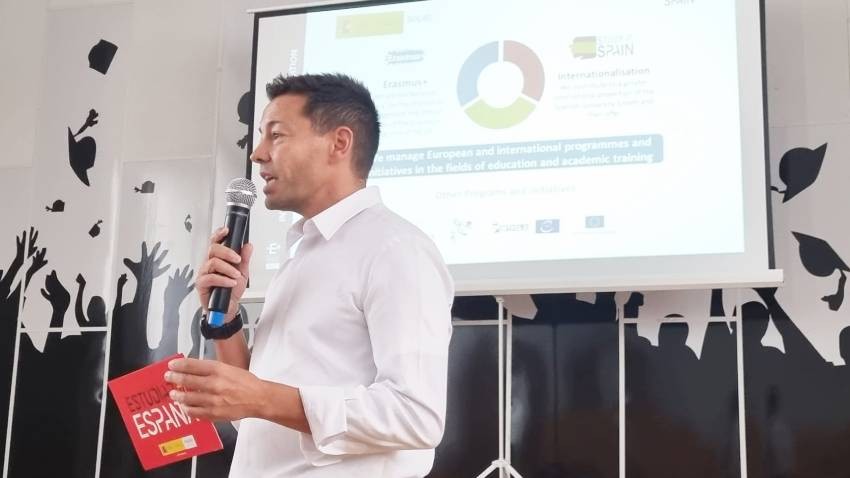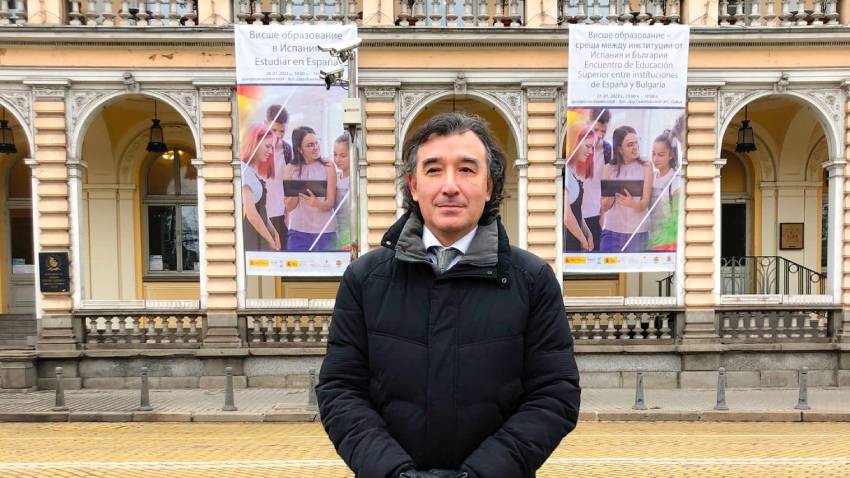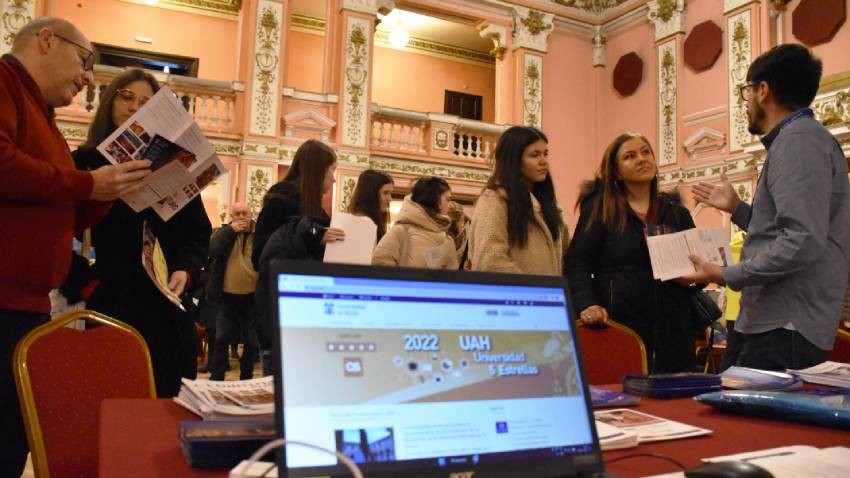The first edition of the Education in Spain exhibition was fruitful for both sides. As we already informed you, the event was organized by the Education Department of the Embassy of Spain in Sofia, the Spanish Service for the Internationalization of Education (SEPIE) with the support of the Bulgarian Ministry of Education and Science and Sofia Municipality. The forum was attended by 10 universities from Spain, which presented their educational programmes to prospective students and informed them about the conditions for enrolment and living in their respective areas of Spain. Meetings were also held between the nine Bulgarian universities and the Spanish higher education institutions to prepare the ground for further cooperation and signing of agreements.
One of the most active participants in the exhibition was Jordi Marin, Technical Advisor at SEPIE, responsible for Europe, Canada and Oceania. In a interview with Radio Bulgaria Mr. Marin gave an insight into how the meetings with the Bulgarian universities went and what his impressions of the Bulgarian students were:
"There were 10 universities from Spain and 9 from Bulgaria. We do not have official agreements yet, but the meeting was very fruitful for both sides. From the Bulgarian side there was a desire for more such events where future cooperation agreements can be negotiated. I was very pleasantly surprised by the high academic level here, as well as the good command not only of Spanish but also of English, which makes communication much easier. The students have shown a very keen interest in science and technology. I would say that they are equally interested in the humanities and the sciences. They also asked about veterinary medicine, human medicine, psychology, international law, Spanish philology, translation, aerospace engineering."
"I came to Bulgaria with very good expectations, which were met and even exceeded," said Francisco Fermín Mallén, Director of the Department of International Relations at the University Jaume I, in Castelló de la Plana.
"I was very pleasantly surprised by what I saw in Bulgaria. We visited several language schools where I met students who showed great interest in the new things we presented to them. I didn't expect so many people to visit us at the exhibition on Saturday. I must say that the interest exceeded my expectations. They asked us about the locations, about the education we offer, about the cost of living in Spain, about the scholarships. After the conversations we had with the universities, we will start with the basics - the mobility of students and teachers. We have found points of contact with many of the universities and I hope that we will soon have contracts to move forward together. I also work as a lecturer in Spain, I have taught Bulgarians and the good impressions I had were confirmed here."
"The University of Las Palmas de Gran Canaria already offers scholarships for Bulgarian students and a wide range of courses," said Dr. Jin Taira, Vice-Rector in charge of internationalisation and mobility at the university:
"My first impression is excellent, I saw very well-mannered students, eager to learn. Language will not be an obstacle to their studies. We don't know if they will stay in Spain, but I see in them a desire to contribute to their homeland. It was a pleasure to talk to them and advise them on the possible way to study in Spain. They wanted to know about law, architecture, psychology, how much it would cost to study and live in the Canary Islands and whether there was a hostel. Tuition is not expensive with us, because the university is state-run, and it comes out to about 1000 euros. As for the cost of living, it is very similar to the rest of Spain. The city of Las Palmas is one of the nine biggest cities in Spain and prices are normal'.
Maria-Yoana Dimitrova is 19 years old, already studying Law at Sofia University “St. Kliment Ohridski”. She was also a coordinator of the event. Although she will finish her studies in Bulgaria, she also plans to pursue a master's degree in Spain.

"Spain is too beautiful not to be attracted by it. I plan to go there in the future under the Erasmus programme of Sofia University or to do a Master's degree in Business Administration or Law. What attracts young people is the life in Spain, the beauty of the country and the exciting everyday life there, and in terms of universities it seems that prospective students are more oriented towards the humanities."
Scotland is known as "The Land of the Brave" and recognized as the "Homeland of the Bagpipe". An instrument that carries the soul of Bulgarian folklore in its sound. According to unofficial data, the "brave" Bulgarians who are building a life in this..
Bulgaria participates in the Global Money Week initiative for yet another year. Global Money Week is an annual global awareness-raising campaign to ensure that young people, from an early age, are financially aware, and are gradually acquiring the..
Bulgaria, as distant as a mirage, has become a beloved land for a man who has never set foot in this country. For nearly 50 years, Mr Jayanta Chakrabarti has been closely following everything that happens here and probably knows more about our history and..
An international conference “AI and education: The road to innovative teaching and learning” brings together 50 teachers from the Bulgarian schools..
In 2024, Bulgaria has 15,737 foreign students, making up 8.6% of all current students in the country. By comparison, this share has doubled over the..
Divers will clean the seabed around the port of Sozopol today, reports BTA. "Since 2018, we have been doing the cleaning, completely voluntarily, with..

+359 2 9336 661
